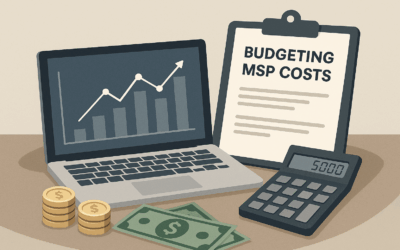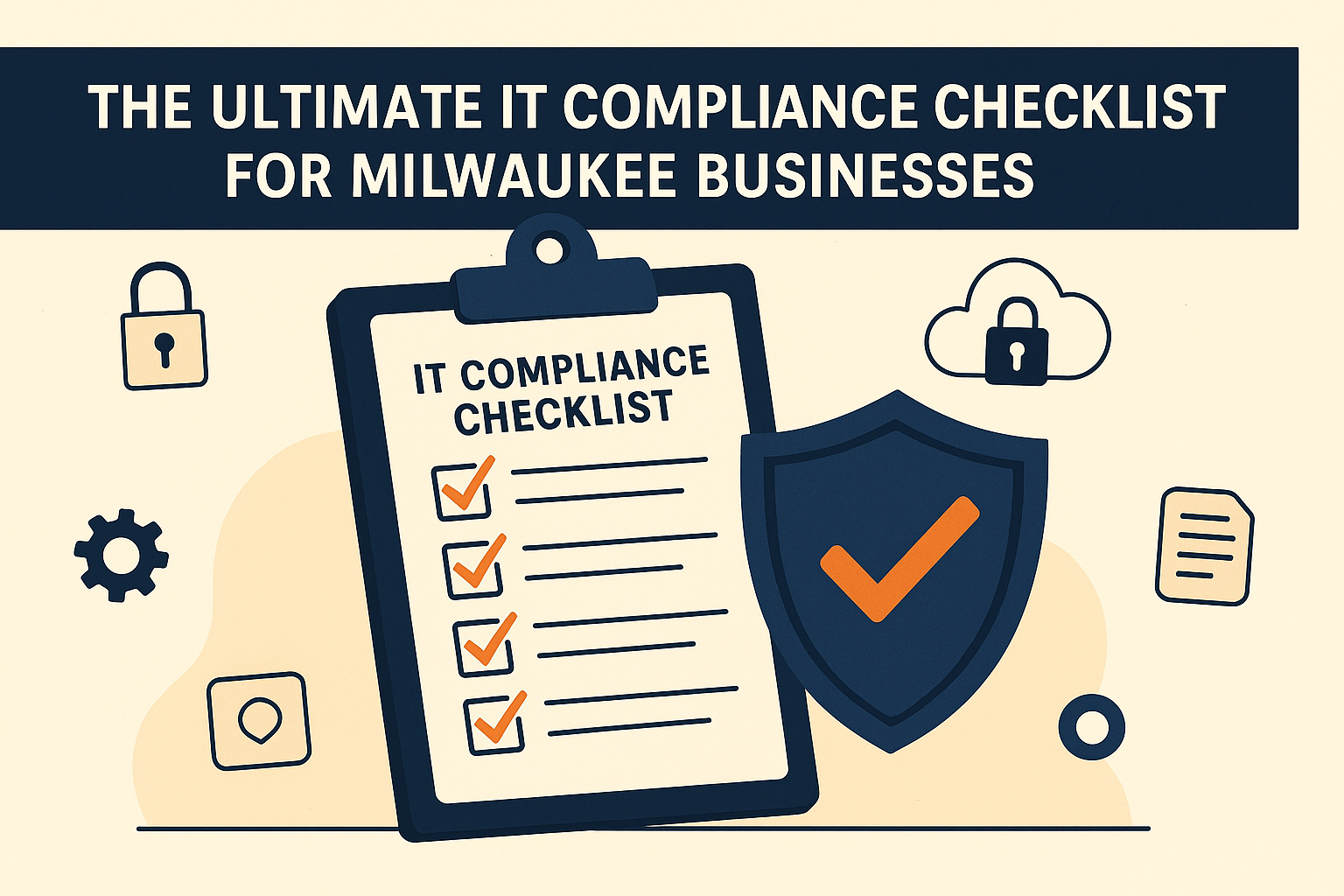Recent reports from Tom’s Guide and Fast Company confirm that private ChatGPT conversations are appearing in Google search results. For individuals, that’s alarming. For business owners, it’s potentially catastrophic.
Imagine an employee using ChatGPT to draft a financial forecast, troubleshoot a security issue, or brainstorm a client project – and that conversation becomes publicly accessible online. That’s not just an embarrassing privacy slip. It’s a potential data breach, a compliance violation, and a reputational risk rolled into one.
If you think it’s only tech-savvy employees using AI, think again. These tools have quietly made their way into marketing, finance, HR, and customer support. Many business owners don’t realize how much company data is already passing through AI tools—sometimes without any oversight.
How Did This Happen?
ChatGPT conversations don’t automatically appear on Google. The issue comes from shared conversation links in ChatGPT. Users can create shareable URLs for their chats, often to collaborate with coworkers, or between personal and work accounts, or during document work. If those links aren’t locked down or get posted publicly (e.g., on blogs, forums, or shared documents that are indexed), Google and other search engines can crawl and index them.
This means what was intended as a simple collaboration step can quickly turn into a public data leak. Employees often don’t realize this risk because they assume that since they’ve signed into an account, especially if the account is paid, that their conversations are always private, even if they opted to make the conversation link “discoverable by anyone.” Random people out there don’t know that the link exists, right? Correct. But search engines do. They can now crawl and index it. The result: internal conversations—sometimes containing sensitive client or operational information—can show up in a basic web search.
Since the issue was reported by Fast Company, there have already been updates that Google and OpenAI are working together on solving this issue. OpenAI CISO Dane Stuckey announced that the feature to share chats in web searches would be removed from the ChatGPT app. The cached chats may still be showing up in search while they’re working with Google to remove it.
However, there are currently no guarantees released that some chat that ended up is search engine’s caches, may not show up, ever. And, more importantly, there is always a risk of things like that happening in the future. Not this exact issue, perhaps, but something completely unforeseen.
Business Impact: Why Owners Should Be Concerned
This isn’t just an IT issue. It’s a business risk with multiple layers:
- Client Trust: If client information appears in a public ChatGPT chat, you risk losing accounts and damaging relationships.
- Compliance Violations: For industries under HIPAA, GDPR, or financial regulations, exposing data via AI tools can trigger audits and fines.
- Competitive Exposure: AI chats often include details about pricing models, sales strategies, or product roadmaps. That’s exactly the kind of intelligence competitors love to find.
- Reputation Damage: Even if content is removed later, archived pages and screenshots can live on. Prospects, partners, and investors doing due diligence may find them long after you’ve taken action.
What makes this problem unique is that it often happens without malicious intent. Employees are just trying to be efficient. But unmonitored AI use can turn into an expensive problem for your business.
Shadow AI – The Hidden Risk

“Shadow IT”—when employees use unapproved software—has been a known security risk for years. AI has now amplified it, giving rise to shadow AI. Employees sign up for free AI accounts, often with personal email addresses, and use them for work tasks. These accounts bypass IT controls, data policies, and compliance standards.
Why do employees do this? Because AI makes their work easier and faster. The problem is that these AI chats may contain proprietary data, customer details, or internal processes. Since no one is monitoring these tools, sensitive information can end up outside company oversight—sometimes even indexed publicly.
If your business doesn’t have a defined AI usage policy, chances are you already have shadow AI operating within your organization.
What’s Already Out There About You or Your Team?
Before assuming your company is safe, take a moment to check what’s public. Try searching Google for your company name, product names, or unique phrases you know exist only in internal documentation.
If you see unexpected results, that’s your first red flag. Set up Google Alerts with your brand name plus terms like “ChatGPT” or “ShareGPT” to monitor future exposures.
Finding indexed ChatGPT conversations tied to your business isn’t just a technical issue—it’s a leadership issue. These conversations may already have been archived or scraped by third parties, making removal more complicated. That’s why understanding and controlling your team’s AI usage is critical.
How to Secure Your Personal ChatGPT Conversations
If you’ve ever shared or saved ChatGPT conversations, start by making sure they’re not indexed publicly. Tom’s Guide outlined how to check and delete them, but here’s a simplified version:
1. Check if your conversations are indexed:
Search Google for your name or unique phrases you remember using in a ChatGPT conversation. If you see your ChatGPT link (often starting with https://sharegpt.com/), it’s public.
2. Delete shared chats you no longer need:
Open your ChatGPT account, go to “Shared Links,” and delete any you don’t want public. This instantly removes access to those chats.
3. Turn off conversation history:
Inside ChatGPT settings, toggle “Chat History & Training” off. This prevents your chats from being stored and used for AI training and keeps them more private.
4. Avoid sharing sensitive data in any AI chat:
Treat AI conversations like email: once it’s shared, you lose control.
How to Secure Your Business From AI Data Leaks
Personal cleanup is only half the solution. For business owners, the bigger issue is controlling how employees use AI. Here’s what to do:
1. Create an AI usage policy immediately
Even a basic one is better than none. Define what kind of company information is acceptable to use in AI tools and what is strictly prohibited.
2. Restrict public sharing of AI chats
Disable or discourage the use of “shareable links” for AI-generated content unless approved by IT or leadership.
3. Centralize AI use with company-approved accounts
Provide employees with secure, company-controlled AI accounts instead of allowing personal logins. This lets you monitor access and enforce policies.
4. Conduct a shadow AI audit
Find out what tools employees are already using. This is often an eye-opener for leadership because unofficial AI use is more common than expected.
5. Train your team on AI security risks
Don’t assume employees know. Provide short, practical training on what’s safe to input into AI and what could put the company at risk.
6. Implement AI governance and monitoring tools
Use platforms designed to track AI usage, enforce policies, and flag risky behavior. This is especially critical if you handle regulated or sensitive data.
Why You Can’t Just Ignore This
The problem is bigger than a few public chats. AI tools are now embedded in how people work, often without guidance or oversight. Ignoring it increases your risk of:
- Data breaches from unintended AI leaks
- Compliance violations that trigger fines and legal issues
- Loss of competitive advantage when sensitive strategy or product data leaks out
- Reputation damage that erodes customer trust
And this isn’t a one-time event. The number of indexed AI conversations is growing, and malicious actors are actively scraping and analyzing AI-generated content for useful information. If your business doesn’t have a plan, you’re relying on luck.
How We Help
We work with business owners to remove luck from the equation. Our services include:
- AI Policy Creation: We create clear, practical policies tailored to your business needs.
- Shadow AI Audits: We identify which AI tools your team is using—official or not—and assess risks.
- AI Governance & Compliance Frameworks: We implement monitoring tools and processes to keep AI use secure and compliant.
- Secure AI Adoption Strategies: We help you leverage AI safely so it becomes a business advantage rather than a liability.
If you want to know exactly what AI risks exist in your business right now, we can help.



